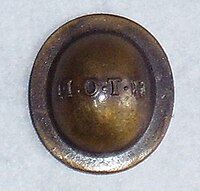Loading AI tools
From Wikipedia, the free encyclopedia
The Memorable Order of Tin Hats (M.O.T.H.) was founded in 1927 by Charles Evenden as a brotherhood of South African former front-line soldiers. The ideal is to help comrades in need, either financially or physically; and to remember all servicemen who have answered the Sunset Call, both in war and peacetime.[1][2]
 | |
| Abbreviation | M.O.T.H. |
|---|---|
| Formation | 7 May 1927 |
| Founder | Moth O |
| Type | Ex-service organisation |
| Legal status | Charity NPO & NGO, (MESCA) |
| Purpose | |
| Headquarters | Flame Lily Park Retirement Homes, Melvern, Durban, South Africa |
Region served | South Africa and Worldwide |
Official language | English |
M.O.T.H National Chairman | Anders "Andy" Boden |
| National Executive Members | |
| Publication | The Home Front |
| Subsidiaries |
|
| Affiliations | Royal Commonwealth Ex-Services League |
| Website | www |

According to the Dictionary of South African Biography, one night in 1927 after he and the editor of The Natal Mercury, RJ Kingston Russell, had seen a war film, Charles Evenden was persuaded to draw a cartoon on 'remembrance'. According to the Dictionary, "The cartoon showed a tin helmet surmounted by a burning candle. Around the flames of the candle were six words – True Comradeship – Mutual Help – Sound Memory".[3]
However, the official M.O.T.H. website carries a cartoon captioned Forgetfulness and this led to the founding of the Order. This is confirmed by the Eastern Province Herald which describes the cartoon as follows: "a bullet- and shrapnel-riddled Allied helmet awash in the ocean. In the background a steamship passes over the horizon, leaving the forgotten, ghostly form of a veteran forlornly wading through the water."
"The concepts of True Comradeship, Mutual Help and Sound Memory were to become the inspiration of a remarkable organisation of ex-front-line soldiers, of all ranks, known as M.O.T.H. Evenden, as the founder of the movement and its guiding inspiration was given the title of Moth O – a position he held until his death."[3]
The membership of the M.O.T.H. movement, under Evenden's vigorous direction and leadership, grew into thousands. Men and women of two world wars, of the Second Anglo Boer War (1899–1902) and even those of former enemy forces streamed into its ranks. All who were prepared to keep alive the memories of comradeship and self-sacrifice – the finer virtues that war brings forth – were welcomed and made at home in shell holes as the meeting premises are called with colourful and meaningful names of war-time memories and occasions. M.O.T.H. shell holes have been opened in Ireland, Malawi, Namibia, Zambia, Zimbabwe and a Cyber shellhole for members all over the globe. Membership was also extended to those who had participated in the South African Border War.[1]
The museum, located in Durban, is modelled on a Norman design from a photograph given to Evenden by Admiral Evans-of-the-Broke. The exhibits extend from the Anglo- Zulu war, 1st and 2nd Boer wars, WW1, WW2, Korean war, Vietnam war, Rhodesian war, and the SWA border war periods. Entrance is free but donations are always welcomed.
In 1948 Evenden opened Mount Memory, a monument to the missing and dead of the Second World War, in the foothills of the Drakensberg mountains. Moth are remembered on the Memorial wall, that have answered the Sunset Call. The Moth Gardens of Remembrance, accommodating the Delville Wood Weeping Cross in Pietermaritzburg. There are also numerous Moth Memorials around the country and managed by the local Moth Shellhole in that area.
Seamless Wikipedia browsing. On steroids.
Every time you click a link to Wikipedia, Wiktionary or Wikiquote in your browser's search results, it will show the modern Wikiwand interface.
Wikiwand extension is a five stars, simple, with minimum permission required to keep your browsing private, safe and transparent.